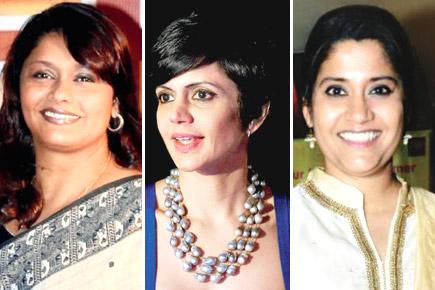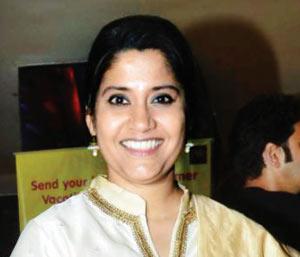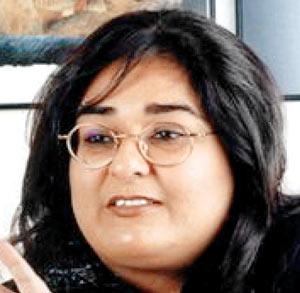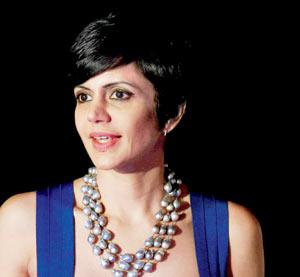Power women of the television industry voice their opinion against new age heroes, who despite being wife beaters, rapists or killers, have the audience rooting for them

Pallavi Joshi, Mandira Bedi and Renuka Shahane
Television shows connect with people on a personal level — switching on the idiot box on entering the home is, at times, more important than reaching out for a glass of water. While ideal bahus like Tulsi ('Kyunki Saas Bhi Kabhi Bahu Thi'), Madhubala ('Madhubala – Ek Ishq Ek Junoon'), or Pragya ('Kumkum Bhagya') have set high standards for women scouting for brides for their sons, it would not be wrong to say that the so-called heroes, who have more than fifty shades of grey to their personality, are now becoming role models for the naïve audience watching these shows.
ADVERTISEMENT

Iqbal Khan and Mona Singh, who feature in 'Pyar Ko Ho Jaane Do'
In the recently-launched show 'Pyar Ko Ho Jaane Do', Mona Singh (Preet) is married to Iqbal Khan (Ishaan), an undercover ISI agent from a neigbouring country. But then he is the ideal son, brother and husband. Similarly, Indian television has several shows that talk about the Mills and Boon heroes, who are rude, abusive and don't care about the opposite sex, but eventually have a change of heart. Examples are aplenty — 'Mann Kee Awaaz Pratigya', 'Sarojini', 'Piya Rangrezz', 'Iss Pyar Ko Kya Naam Doon... Ek Baar Phir'. In spite of their ill-will, the heroines love them to bits. But do we all?
Veteran actress Renuka Shahane, who was part of shows like 'Kora Kaagaz', 'Imtihaan' and 'Sailaab', sees it as a "subversive way of strengthening patriarchy". "You start off with a concept of women's empowerment. The idea is to showcase the girl fighting her oppressors, but ultimately it becomes like 'The Taming Of The Shrew', which is done to death," she says.

Renuka Shahane, veteran actress
While the West has adapted to the culture of season-wise showcase of a drama, the idea doesn't seem to register much in Indian daily soaps. Storylines gets stretched like chewing gum. And in order to keep the appeal alive, the content is often forced. "Over time, makers water down the characters and the drama in the show to fit the daily soap format, which automatically shifts away from the main concept. Like in 'Mann Kee Awaaz Pratigya', it's true that the hero loved Pratigya, but the manner of portraying that love was extremely aggressive, volatile and not acceptable in today's world. But then she gets married to him and finally, becomes part of that system. They drag the show long enough for people to forget the real concept of the show. After three-four years, when the man has a change of heart, it becomes pointless because the show is drawing to an end. Basically, what you have shown in three years is what people are going to stay with; the empowerment comes too late. I think the tone of the show should be set right from the start, and come what may, they should not waver from it. You may start off with a soch nayi, but ultimately, it is still soch wahi," adds Renuka.
On the other hand, writer-director-producer Vinta Nanda believes the lack of investment in writers is the reason for abusive hero concepts taking over for survival in the TRP race. She says, "When you lean on abuse and violence as the main dramatic elements in your story, it means you don't have good storytellers to narrate a good concept. If you are to take sophisticated, intellectually empowered storytellers to write for television, the entire space would be very different. You would end up with deeper understanding of the relationship between men and women. We have to depend on violence because there is no other way to catch the audience's attention — because writers are at the bottom of the food chain."

Vinta Nanda, writer-producer
As far as the entertainment industry is concerned, writers are the most dispensable unlike in other parts of the world, feels Vinta. "They cost the most. Good writing would not let this kind of atmosphere prevail. The reason is we don't invest in storytelling. An episode is written today, produced tomorrow and broadcast a day later. So, you will use every negative device to create drama because you need the ratings. Hence, you will take the worst of societal realities and keep flogging it because that keeps the dramatic element alive. You don't care a damn about what effect such content has on society at large," she explains.

Pallavi Joshi, veteran actress
But, of course, there is an argument about why social responsibility lies more with TV as compared to movies? Pallavi Joshi rightly answers, "You go out, buy a ticket and the entire experience of cinema is larger than life. It gets into the realm of unbelievable. But when it comes to television, it comes straight into the house. In most homes, the TV is like a family member, it is always on in the background. Whether you are cooking, or have guests over, there are people who never turn off their TV sets. They will reduce the volume, but not switch it off."
Mandira Bedi, who portrayed a strong, liberated woman in 'Shanti', says more than films, television has to be less of a mirror to society and more as an inspiration: "The characters or the protagonists have to be responsible about the kind of content that is being put out. Anti-hero is a polite way of saying it — when he wins in the end or when he gets the girl, I think it gives out a wrong message.
If these daily soaps inspire men to behave like that in real life, it's not something our country needs."

Mandira Bedi, actress and entrepreneur
Truth be told, the concept of a man disrespecting a woman whether it is out of love, hatred, or under the influence of alcohol, is unacceptable. "If this anti-hero concept is really happening on television, it is quite appalling. I wonder where the good ole days have gone when we used to have good writers and classic stories that could make a difference," rues Pallavi. Mandira adds, "If people believe this is the way a man has to be to get the girl, I am not okay with it."
 Subscribe today by clicking the link and stay updated with the latest news!" Click here!
Subscribe today by clicking the link and stay updated with the latest news!" Click here!






